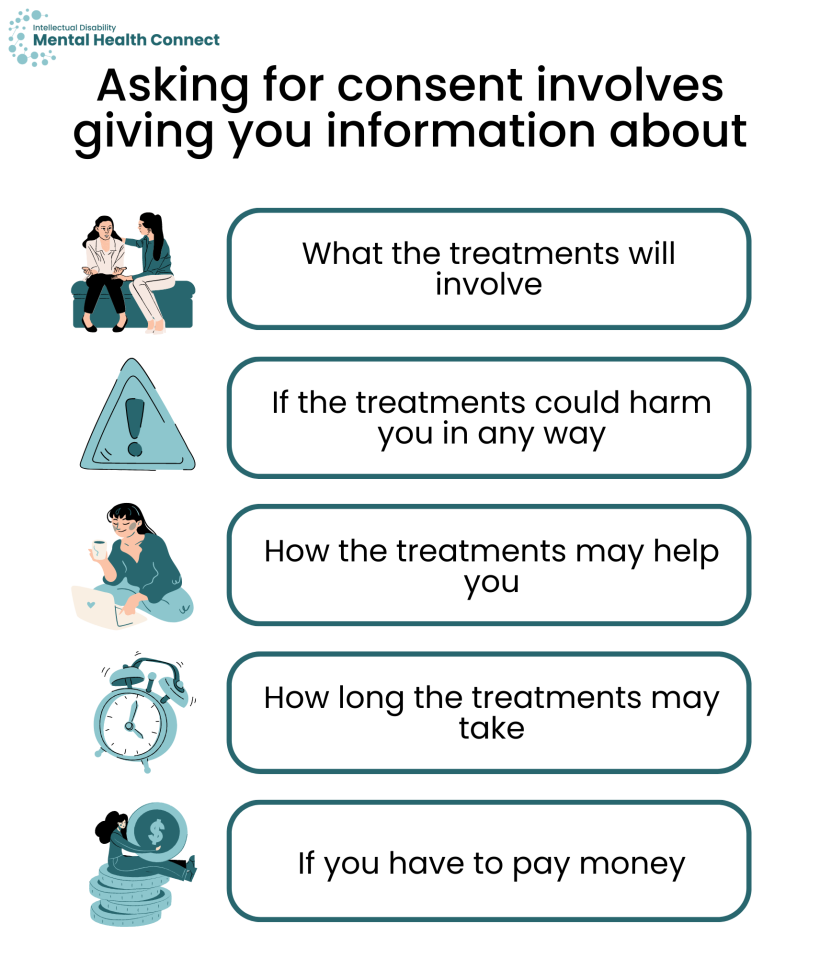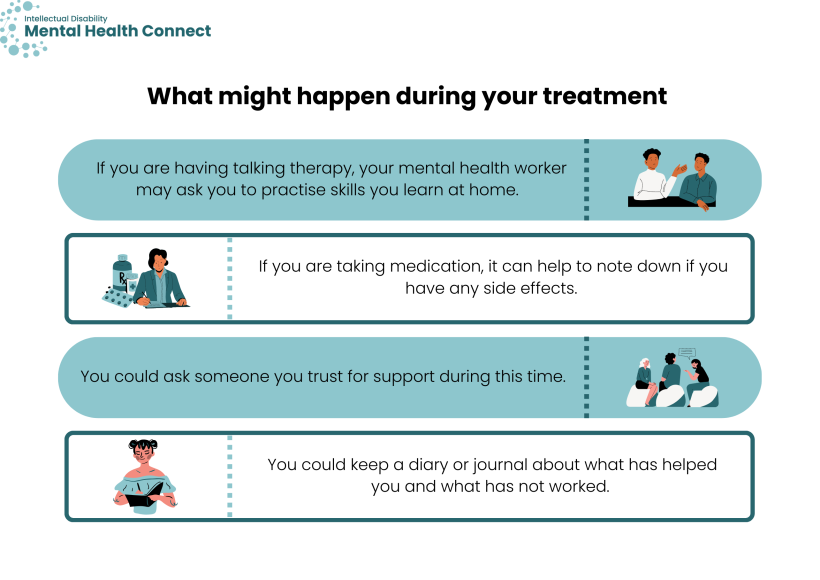Treatment
Jump to a section below
Key points
- Treatments are things that can help you feel better. Treatments can be therapies and medication.
- Talking therapy is when you communicate with a mental health worker to learn new ways to cope with how you think or feel.
- Medication is sometimes called medicine or drugs. Medicine can be in a tablet, a pill, a drink, or an injection. Doctors let people know which medicine to take to help make them better.
- You will make a plan with your mental health workers about what treatments may help you.
After your assessment, your mental health worker will discuss what could help you to feel better. They may suggest treatments. Treatments are things that can help you feel better. Treatments can be therapies and medication.
Making a mental health care plan
Your mental health worker will discuss making a mental health care plan with you. A mental health care plan is a list of things you and other people can do to help you get better. A care plan is sometimes called a treatment plan.
Someone you trust can help you and the mental health worker to make your mental health care plan.
This could be your:
- carer
- family member
- guardian. A guardian is a person who helps you make decisions about parts of your life when you cannot make decisions by yourself.
- support worker
- friend
- advocate. An advocate is someone who helps you to speak up and get the support you need.
Treatments that are available
There are different treatments that can help improve mental health. Two of the main treatments are talking therapy and medication.
Talking therapy
Talking therapy is when you communicate with a mental health worker to learn new ways to cope with how you think or feel.
To communicate is how you understand and share your feelings or information.
Psychologists or counsellors usually use talking therapies to help you.
A psychologist helps you with your mental health by talking with you. Psychologists help you find things you can do to feel better. Psychologists do not give you medication.
A counsellor is a health worker. You can communicate with them about problems in your life. You can see a counsellor if stressful things happen in your life, or you are worried about the future.
Some common talking therapies you may hear about are:
- cognitive behavioural therapy (or CBT for short). CBT can help you change how you think and what you do to have more positive feelings. You can find out more at healthdirect.
- mindfulness which helps you to focus on what is happening now to calm your mind. You can find out more at healthdirect.
Medication
Medication is sometimes called medicine or drugs.
Your doctor may give you a new medication to take. If you already take medication, your doctor may change the amount you take. Your doctor may also tell you to stop taking some medications.
It is important to keep taking your medication until your doctor tells you to stop, even if you start to feel better.
Your GP or a psychiatrist may manage your medication.
A psychiatrist is a doctor who helps you with your mental health using talking and medication.
Sometimes people with intellectual disability are told to take medications that are not right for them, or in too high an amount. There is more information in this easy read sheet here. You can talk to your doctor about these issues.
Other support
- Other things can help mental health, such as going to a mental health support group. A mental health support group is a small group of people you meet with to discuss mental health. People usually discuss how they feel and things that make them feel better.
- You can find more information about organisations that run support groups in Mental health organisations and online information. You can ask your GP or mental health worker about support groups in your local area.
- Having a healthy lifestyle can also help mental health. This includes getting enough sleep, eating well, and exercising. For information on other things that can help you to have good mental health see Tips for good mental health.
Choosing treatments and consent
You may have more than 1 treatment. For example, you may have talking therapy and medication.
Mental health workers will discuss what treatment is best for you. They will also help you to choose what treatment you want.
They will generally ask you if it is OK before they start any treatment. This is called asking for consent. They will go through:
- what the treatments will involve
- if the treatments could harm you in any way
- how the treatments may help you
- how long the treatments may take
- if you have to pay any money.

Sometimes a person responsible needs to make a decision about what treatment is best for you. A person responsible is either:
- a guardian
- partner
- carer
- family member or friend.
Some treatments can be done at home, but some need you to go to hospital. If you need to stay in hospital for your mental health, you may be a voluntary patient or an involuntary patient.
- When you choose to go to hospital, this is called being a voluntary patient. You or your guardian will have a choice in what treatment you have.
- Being an involuntary patient is when you must stay in hospital for your mental health until you are well enough to go home. It is not your choice when you can leave. You may be given a treatment you need even if you do not want it.
How to know what will work best for you
Discuss with your GP or mental health worker about what treatment may work best for you. You can also ask someone you trust what they think.
You may have tried a certain treatment in the past. Think back to whether it helped you or not.
Sometimes you will not know how a treatment will work for you until you try it. It is OK to try a treatment for a while. If it is not working, you can work with your GP or mental health workers to try something else.
During your treatment

During your treatment, you will have appointments with your mental health workers and GP. Sometimes this is quite regular. For example, you may see your psychologist every week. If you are taking medication, your GP or psychiatrist may want to see you every few months.
- If you are having talking therapy, your mental health worker may ask you to practise skills you learn at home. For example, they may give you sheets to fill in at home to note down the feelings you have during the week.
- If you are taking medication, it can help to note down if you have any side effects. A side effect is an unpleasant effect of medication on your body or thinking. A side effect can make you feel unwell. Some medications can give you side effects. You can also ask someone to write this down for you. You can then take this list when you next see your GP or psychiatrist.
- You can use 3DN’s Medication side effects diary to note down any side effects you have. You can then take this diary to your GP or psychiatrist.
- The Council for Intellectual Disability has a factsheet on taking medications Me and my medication.
- There are also lots of factsheets on different medications here. You may like to ask someone you trust or your GP or mental health worker to look at these with you.
- You can get a Home Medicines Review. A Home Medicines Review is when a pharmacist checks if you are taking your medications correctly. A pharmacist knows a lot about different types of medicines. A pharmacist is sometimes called a Chemist. This Easy Read factsheet Home Medicines Review also lets you know how you can get advice on the medicines you take.
- You can ask someone you trust for support during this time. They may be able to help you practise skills at home. They can discuss with your mental health workers about how they can help you if you want. It is OK if you do not want them to communicate with your mental health workers.
- You could keep a diary or journal about what has helped you and what has not worked. This can help to plan your care in the future. You could keep a diary of your feelings. You could use the My Feelings Chart on page 48 of the Feeling Down: Looking After My Mental Health Easy Read guide.
If you must go to hospital for your mental health
If you are very mentally unwell, you may have to stay in a hospital.
Hospital mental health workers can:
- help you to communicate how you feel
- recommend other treatments like medicine that may help you.
You may feel scared if you have to stay in hospital. This is very normal. But there are people who can support you.
- In hospital, you can ask to communicate with someone if you are worried, anxious, or scared. This could be a nurse, psychologist, counsellor, or social worker. For more information about these health workers visit Mental health services.
- Ask if someone can visit you often. This could be a carer or family member.
- If someone else on the ward is worrying or bothering you, tell hospital staff. They can help you.
You can ask to communicate with an Official Visitor in the hospital. Official Visitors are people who visit the hospital. Official Visitors make sure people in the hospital are treated well. Official Visitors do not work for the hospital. You may want to communicate with an Official Visitor if:
- you have an idea for how the hospital can treat you better
- you want to make a complaint. A complaint is when you let someone know that you are not happy with something.
Resources
- You can find out about Cognitive behavioural therapy and mindfulness at healthdirect.
- The Council for Intellectual Disability has a factsheet on taking medications Me and my medication.
- There are also lots of factsheets on different medications here.
- The Home Medicines Review factsheet lets you know how you can get advice on the medicines you take.
- This factsheet helps you check you are not taking too much medication.
- When you choose to go to hospital, this is called being a voluntary patient. You can find out more here. You can find out about your rights here.
- Being an involuntary patient is when you must stay in hospital for your mental health until you are well enough to go home. It is not your choice when you can leave. You can find out more here. You can find out about your rights here.
- For more information on getting help in other areas of your life, see The Disability Gateway or NDIS website.